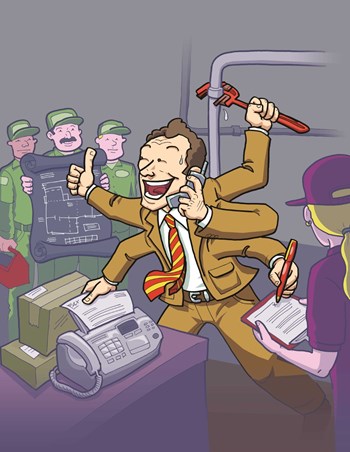
Some property managers fly through their to-do lists with the greatest of ease, while others send you to voicemail. Again. The difference between a serviceable manager and a really great one may not be something they’re born with; but many in the industry feel superior management skills can and should be learned. Great managers create results and foster trust in their clients—it can be that simple.
A Little of Everything
Co-op and condo property management may be one of the more multifaceted careers a person can pursue. The list of duties is long and varied—many managers say that they rarely find themselves doing the same thing two days in a row. The tasks before them run the gamut from technical to administrative, long-term strategic to pressing emergency, customer-service related to even therapeutic in nature—after all, property managers work in and around people’s homes. Tensions can run high, even on seemingly small jobs.
Property managers may, on any given day, fix a leaky pipe, hire a contractor to plow Chicago’s blowing and drifting snow from driveways, pay bills, file paperwork, research the big electrical overhaul that needs to be done before summer, and report all of this to the board. A property manager may sit in on a committee meeting, talk to a lawyer, troubleshoot a bad Internet connection, read board minutes, or post a flyer about a lost dog. It’s all in a day’s work, if you’re a great property manager.
There are hundreds of property management firms in Chicagoland plus plenty of independent managers as well. According to Salary.com, the average salary for a property manager in the U.S. is currently around $80,000. So what makes some of those management professionals worth their weight in gold?
It’s a Tough Job But...
Dealing with regulatory bureaucracies like ComEd may be a source of great gnashing of teeth for property managers across the region, but it’s actually not the biggest issue for most. When a manager can successfully navigate the waters of the almighty board, you should probably hang onto him or her.
“Condo boards are made up of homeowners who have different ideas and sometimes different motives,” says Sandy Albecker, president of Chicago’s Enlan Condominium Management Corporation, a condominium and townhome management firm. Albecker says that there are plenty of formidable challenges that face a property manager but perhaps the biggest is that ever-evolving relationship with the board. “Associations sometimes have a hard time attracting qualified board members who have the association’s best interest at heart. As a result, sometimes homeowners with personal agendas run and are elected. This makes the property manager’s job a real challenge.” The “mixed agendas,” as she puts it, have the ability to stop progress in its tracks, even if the manager is top-notch.
Paul Houillon, president of Chicago's Connected Property Management ranks board trouble high on the list of headaches too, but notes that all the other tasks work to compound the problem.
“Behind each [board] issue is likely to be an owner or board member who is understandably upset or concerned about the problem and is pressing for the fastest possible resolution at the lowest possible cost. While a single emergency causes this level of emotion from an owner, a property manager must calmly, quickly and effectively handle multiple such issues at the same time.”
Which isn’t easy. What separates the men from the boys (or the girls from the women, though the majority of property managers are male) is the level of professionalism exhibited by a manager when a tsunami hits and the results of the action he or she takes, whether the trouble is with the board or the boiler.
Rising Above the Fray
Providing truly great management means laying groundwork. A property manager can’t prove that they are the best the HOA has ever seen within a matter of days; it may even take years.
“The ability to effectively handle situations is in many ways based on the prior investment that the manager has made in the relationship with their clients,” says Houillon, who points out that emergency situations that arise tell a lot about a manager’s competency and the level of trust between manager and client. “Much of the stress that can swell is triggered by the owner and how they react, their interactions with the manager and the resulting decisions they make,” he says. “A key quality of a great manager is their ability to make an owner feel comfortable and assured during an emergency. This doesn’t happen overnight and is based on the level of trust the manager has earned during their relationship with the owner. A manager’s ability to shine in an emergency situation is based in part on their hard work and dedication to client support leading up to the emergency.”
In other words, the more the board trusts their property management, the less likely they are to panic if something goes wrong. The less they worry, they less they pester their property manager, which in turn allows the property manager to work more efficiently to fix the emergency situation or just get work done from day to day. As Houillon says, “A level of reduced ‘noise’ allows the manager to focus.” And that means fewer errors, more progress and— like magic—a higher level of trust from the unit owners and shareholders, which cements the overall relationship.
Tim Krueger, co-founder of Chicagoland’s T.H.E. Management Inc. adds that attention to detail is everything. “In communication, problem solving, finding solutions—you have to pay attention.” Krueger says that the success of his firm, which specializes in foreclosures and HOAs with building code problems, stems from their ability to offer creative solutions that actually work for the people they serve—again, results matter. “We listen to them,” he says, which is never a bad way to gain someone’s trust.
Best Case Scenario
For Albecker, “A great manager delivers a quality program in an efficient manner, enhances the quality of life for the homeowners, and protects their property values.” And as for that oft-challenging board, Albecker doesn’t bat an eye. For her, issues of all shapes and sizes with the board comes with the territory, like it or not—and she sees the board as a partner, not a foe. “A great manager takes most of the headaches away from the board, who are generously giving of their time.”
After all, the manager is there to serve. “The great manager has to consistently try to do what is right for the association,” Albecker says. “Even if the board votes for a resolution that the property manager does not believe is in the best interest of the association, when the board has made a final decision, the great property manager carries out the board’s wishes to achieve the best result.”
The best management, however, and the formula that delivers the most solid results ever, happens when the manager and board work together. “It is unfortunately very common for an association to have only a small handful of owners that are willing to participate in the running of the association,” Houillon says, lamenting that attendance at board/manager meetings is often quite low. “There is nothing more valuable than having unit owners involved in at least some aspects of governing the association. The feedback and input from the unit owners allows [managers] to make changes and improvements that are truly beneficial and impactful. Likewise, it is impossible for a manager to affect areas of discontent unless they are made aware of the concerns. In almost all cases the manager is happy to make progress in areas that are important to the unit owners—that, of course, is a top priority of a great manager.”
Traits of an Effective Property Manager
Of course, a great management company is defined by the quality of its individual managers. A company committed to supporting and nurturing its employees is more likely to treat your building community as a valued client— and a good property manager shares many qualities with his or her parent company, plus a few extras. Your property manager should:
• Understand that he or she is answerable to the board of directors or board of managers
• Understand that his or her job is to deal with day-to-day issues so the board embers can focus on policy and direction
• Understand that they must be accessible, and keep open lines of communication with both board members and residents
• Respond to board members’ and residents’ questions in a timely, courteous, and knowledgeable manner
• Know how to delegate tasks to avoid becoming overextended
• Think ahead and be proactive to avoid costly and inconvenient surprises
• Cooperate with the association board to maximize value of meetings
• Cooperate with service providers and cultivate productive, positive relationships with professionals serving the building community
• Know when a question or problem goes beyond the reach of his or her expertise, and know who to call upon for help in such a situation
• Take an interest in refining his or her professional skill set by participating in continuing education and development opportunities.
Help Me Help You
To continually improve performance, being continually open to new ideas and new information is essential; getting feedback is important, too. This is certainly true for property managers, but the board and the management company should play a big role in both offering new information and giving credit where credit is due.
“Our company has written contracts for new accounts that are tied to results, as measured by a survey of the board and/or homeowners,” say Albecker. “It is important that the HOA board give positive feedback to the great manager. The feedback should be both private and public. If a manager does a great job, there can be a financial incentive tied to that measured performance. When a manager goes above and beyond for an association to deliver a result that benefits the association, the HOA board should certainly express its appreciation. But the job of rewarding great management does not just fall on the HOA board. The management company should provide consistent encouragement, praise, and incentives to help keep great managers motivated.”
Classes, seminars, conferences, workshops—even mobile smartphone apps—all help get a manager the information he or she needs in an ever-changing, dynamic job. Those who hold a manager in their employ should see to it that they have access to education and improvement. Good vibes help, and constructive criticism, too.
And for those Chicagoland-area firms feeling the pinch of the recession, there is hope for great property management to win the day.
Mary K. Fons is a freelance writer and a Chicago resident.






Leave a Comment